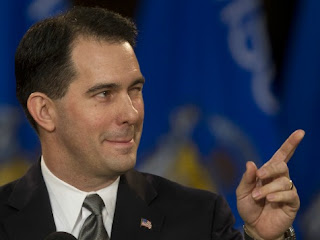 |
| Photo Credit: Dan Lampariello |
To answer that question, one must look at factors of metropolitan preparedness, risk analysis, and Milwaukee’s methods of risk mitigation. Emergency preparedness for a terrorist event, accident, or natural hazard is the first line of defense in minimizing potential for loss of life and property. Emergency management officials say that every citizen should have basic items on hand in the event of an emergency, such as water, food, and first aid kits. In extreme emergencies, Milwaukee metropolitan counties would operate under an incident command system to coordinate efforts. Mutual aid agreements, protocols, and standardized operations exist to mobilize local, state, and federal resources as needed. First responders of every county have training in responding to any emergency event, including a terrorist attack, and participate in drills to recreate the chaos following a terrorist event.
Most wouldn’t think of Wisconsin as a potential Al-Qaeda target; however the marathon bombings show us that any event in any city is a potential target for people who are indiscriminant in killing. Wisconsin Homeland Security has dealt with droughts, floods, and hazardous accidents in the past, and recognizes the risk of terrorism in Wisconsin. Wisconsin has a reputation as an agricultural center, and proximity to Chicago and Minneapolis add additional risk to Wisconsin population centers. Because 5 of the 10 largest cities in Wisconsin are in the Milwaukee metro area, these population centers put Southeast Wisconsin at a greater risk for a terrorist attack. Risks include Wisconsin’s critical infrastructure, public gathering sites, large water systems, utilities, agriculture industry, and critical manufacturing sites. A Wisconsin Hazards Vulnerability Report uses factors such as probability, preparedness, and impact to create a relative threat risk. The relative threat risk to Milwaukee metro for a radiological attack is 63%, which is lower than the multiple vehicle highway accident relative threat of 52%. An influenza pandemic received the highest relative threat score of 81%. Officials maintain that the largest threats to the Milwaukee metro are influenza pandemics, rail accidents, and extreme weather.
Terrorism and sleeper cell potential has prompted authorities to take a proactive stance on risk mitigation. Waukesha County Emergency Management Coordinator William Stolte explains that Waukesha County trains first responders to maintain situational awareness in a terrorist event, including awareness on secondary devices and hazards. Sheboygan County conducts frequent drills and exercises under county Director of Emergency Management Steven Steinhardt. One exercise included the annual NASCAR Nationwide event hosted in the county.
Event planning is key in minimizing security risks at public gatherings. Steve Fronk, Milwaukee Director of Emergency Management helps event organizers with security. Fronk also leads a group called Urban Area Security Initiative, a federal grant program for 5 metro counties to assess security risks and potential regional impacts. Any response to a terrorist attack would be event dependent. Specifics of response plans were not given to protect first responders. However, the Milwaukee Sheriff’s Department doesn’t believe security and event planning were the issues in Boston. The Sheriff’s Department is concerned with the lack of intelligence coming out of local fusion centers, which relay information to authorities. Sheriff David Clarke believes there are mounting counterterror intelligence issues. This comes after the grant program designated to Milwaukee for terrorism response was cut due to federal risk analysis. With decreased federal funding for local intelligence gathering, authorities must rely on a vigilant and aware public. WI Watch is a local program where citizens are urged to report any suspicious activity to counter terrorist threats. WI Watch, in conjunction with federal programs like the ‘If You See Something, Say Something’ campaign urges the public to report suspicious activities and behavior to authorities. An aware public is the best way to minimize terror related risks.
The Milwaukee metropolitan area uses preparedness, risk assessments, and first responder training to prepare for emergency situations. The cooperation between metro counties ensures Milwaukee is a generally safe city. However, after the terrorist attack in Boston and ensuing manhunt which shut the city down, officials are not willing to downplay terrorist risks to the Milwaukee area. Increased security measures in neighboring Chicago may make the Milwaukee area a more attractive target for terrorist sleeper cells. A vigilant and aware public may just be the deterrent needed to avoid terrorism in Milwaukee. If you see any suspicious activities or behavior, report it to 1-877-WIWATCH. Together, we can minimize the risk of terrorism and keep the Milwaukee metro area safe.
Freedom Weekly, April 2013 Vol. 003 Issue 009




